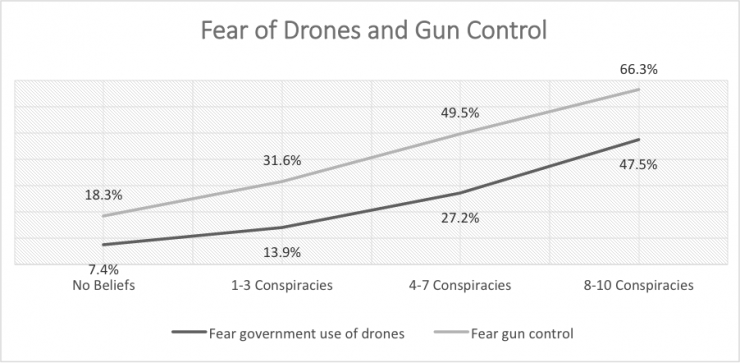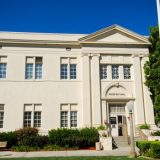What Aren’t They Telling Us? Chapman University Survey of American Fears
October 11, 2016
The Chapman University Survey of American Fears Wave 3 (2016) includes questions asking about levels of belief in nine different popular conspiracies/conspiracy theories. The survey asked a random sample of Americans if “the government is concealing what they know about…” the JFK assassination, Barack Obama’s birth certificate, alien encounters, the recent death of supreme court justice Antonin Scalia, the moon landing, the 9/11 attacks, plans for a one world government, the AIDs virus and global warming.
Belief in Conspiracy
The most prevalent conspiracy theory in the United States is that the government is concealing information about the 9/11 attacks with slightly over half of Americans holding that belief. Approximately half of Americans also believe in a cover up regarding the assassination of John F. Kennedy.
Significant minorities of Americans (40%+) believe the government is hiding information about extraterrestrials and global warming. Several other conspiracy theories are convincing to about a third of Americans including plans for a one world government (33%), Obama’s birth certificate (30%) and the origin of the AIDS virus.
About a fourth of Americans believe there is something suspicious about the death of supreme court justice Antonin Scalia (28%) and slightly less than a fourth think the government is covering up information on the moon landing (24%).
| The government is concealing what they know about… | Percent Agree or Strongly Agree |
| The 9/11 attacks | 54.3% |
| The JFK assassination | 49.6% |
| Alien encounters | 42.6% |
| Global warming | 42.1% |
| Plans for a one world government | 32.9% |
| Obama’s birth certificate | 30.2% |
| The origin of the AIDs virus | 30.1% |
| The death of supreme court justice Antonin Scalia | 27.8% |
| The moon landing | 24.2% |

It’s All a Conspiracy
We find strong evidence that the United States is a strongly conspiratorial society. Only about a fourth of Americans (26%) disagreed or strongly disagreed with all nine conspiracy theories. The remaining three-fourths (74%) of the population finds at least one conspiracy theory somewhat convincing; if not more than one. Fully 10% of the sample agreed or strongly agreed with all nine conspiracies.
| # of Conspiracy Beliefs | Percent |
| No conspiracy beliefs | 26.0 |
| 1 conspiracy belief | 11.1 |
| 2 conspiracy beliefs | 10.5 |
| 3 conspiracy beliefs | 11.5 |
| 4 conspiracy beliefs | 8.2 |
| 5 conspiracy beliefs | 7.1 |
| 6 conspiracy beliefs | 5.1 |
| 7 conspiracy beliefs | 5.5 |
| 8 conspiracy beliefs | 4.3 |
| 9 conspiracy beliefs | 10.5 |
Perhaps most indicative of the conspiratorial nature of Americans is the
tenth
conspiracy theory we asked about…one which, to our knowledge, we created.
Respondents to the Chapman University Survey of American Fears were asked if “The government is concealing what they know about…the North Dakota crash.” A third of Americans (33%) think the government is concealing information about this invented event.
Were the North Dakota crash added to the ranked list of conspiracies (see above), this invention would rank as number six, just under plans for a one world government.
| The government is concealing what they know about…the North Dakota Crash
|
% |
| Strongly Disagree | 16.2 |
| Disagree | 51.2 |
| Agree | 25.0 |
| Strongly Agree | 7.5 |
The Conspiracy Theorists
We examined the extent to which the following characteristics were related to believing in conspiracy theories.
-
- Age
-
- Church Attendance
-
- Employment status
-
- Gender
-
- Income
-
- Marital status
-
- Number of children at home
-
- Political party
-
- Race/ethnicity
-
- Region of the country
-
- Religious affiliation
-
- View of the Bible
The following are the personal characteristics that are significantly associated with higher numbers of conspiracy beliefs, ordered by the magnitude of the effect.
People with the highest number of conspiracy beliefs tend to have/be:
-
- Married
-
- Biblical literalist
-
- Non Judeo-Christian religion
-
- Catholic
-
- Employed
-
- Cohabitating
-
- Divorced or separated
-
- Republican
-
- Lower level of education
-
- Infrequent church attendance
-
- Lower level of income
The most likely person to believe in a conspiracy theory (or many) is a Republican who is employed, but has a lower level of income and education. He or she is likely to be a Catholic or a member of a non-Judeo-Christian religion but attend religious services infrequently. Those who are Christian will tend to believe that the Bible is the literal word of God. Conspiracy theorists come from a variety of marital statuses and may be currently married, cohabitating or divorced or separated.
The Consequences of Conspiracy
In our analyses we have found that the tendency to believe in conspiracies is related to a host other beliefs and behaviors. Conspiracy theorists tend to be more pessimistic about the near future, more fearful of government, less trusting of other people in their lives and more likely to engage in actions due to their fears, such as purchasing a gun.
In the following analyses we placed people into four groups based on the number of conspiracies in which they believe; No conspiracies, 1-3 conspiracies, 4-7 conspiracies and 8-10 conspiracies.
[1]
Conspiracies and the End of the World
Belief in conspiracies is significantly related to agreement with the statement “The world will end in my lifetime.” Belief in the impending end of the world increases steadily with belief in conspiracy theories.

[1]
Here we attempted to group people into quartiles as closely as possible given the pattern of responses. This breakdown includes our control item on the “North Dakota crash.” Approximately 26 percent of respondents (26.3) did not believe in any of the conspiracy theories. About thirty percent (29.4) believed in 1-3. Twenty-six percent find merit in 4-7 of the conspiracy theories presented. The remaining 18.3% believed in all ten conspiracies.
Conspiracy Theories and the Distrust of Others
The Chapman University Survey of American Fears asks respondents the extent to which they fear “your significant other cheating on you” and “others talking about you behind your back.” As belief in conspiracy theories rises, so does fear and distrust of others.

Conspiracy Theory and Fear of Government
Given that most conspiracies imply malfeasance on the part of government (and indeed our questions were worded as such), we expected to find conspiracy theory belief to be related to fear of government. In nearly all cases, government fears are in the majority at the highest levels of conspiracy belief.


Conspiracy Theory and Fear-Based Actions
The Chapman University Survey of American Fears asked respondents “Have you done any of the following because of your fears?” Two of the possible actions we asked about were purchasing a gun out of fear and voting out of fear.
Belief in conspiracy theories is also significantly associated with fear-based actions. For example, about seven percent of people who did not believe in any conspiracy theories reported purchasing a gun out of fear. Once someone believes in at least four conspiracy theories, the likelihood of purchasing a gun out of fear more than doubles to approximately 16%.


